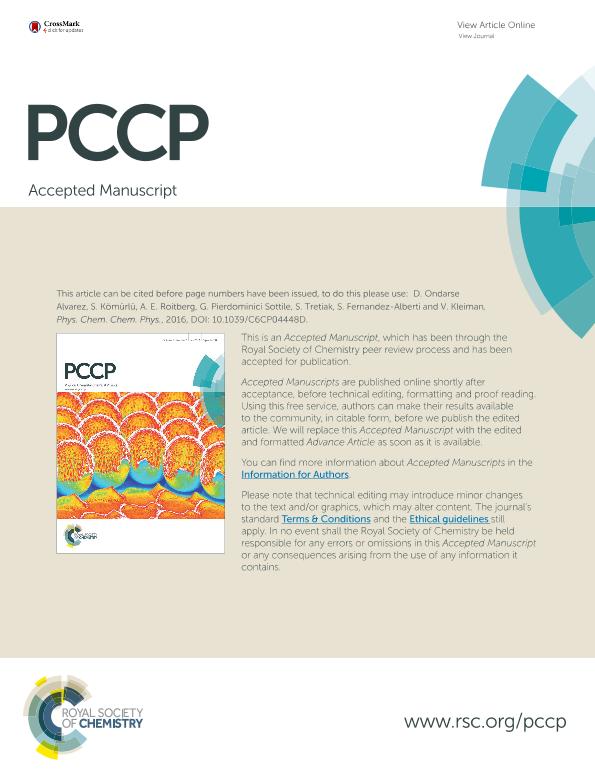Mostrar el registro sencillo del ítem
dc.contributor.author
Ondarse Alvarez, Dianelys

dc.contributor.author
Kömürlü, S.
dc.contributor.author
Roitberg, Adrián

dc.contributor.author
Pierdominici Sottile, Gustavo

dc.contributor.author
Tretiak, S.
dc.contributor.author
Fernández Alberti, Sebastián

dc.contributor.author
Kleiman, V. D.
dc.date.available
2019-03-21T14:54:13Z
dc.date.issued
2016-08
dc.identifier.citation
Ondarse Alvarez, Dianelys; Kömürlü, S.; Roitberg, Adrián; Pierdominici Sottile, Gustavo; Tretiak, S.; et al.; Ultrafast electronic energy relaxation in a conjugated dendrimer leading to inter-branch energy redistribution; Royal Society of Chemistry; Physical Chemistry Chemical Physics; 18; 36; 8-2016; 25080-25089
dc.identifier.issn
1463-9076
dc.identifier.uri
http://hdl.handle.net/11336/72183
dc.description.abstract
Dendrimers are arrays of coupled chromophores, where the energy of each unit depends on its structure and conformation. The light harvesting and energy funneling properties are strongly dependent on their highly branched conjugated architecture. Herein, the photoexcitation and subsequent ultrafast electronic energy relaxation and redistribution of a first generation dendrimer (1) are analyzed combining theoretical and experimental studies. Dendrimer 1 consists of three linear phenylene-ethynylene (PE) units, or branches, attached in the meta position to a central group opening up the possibility of inter-branch energy transfer. Excited state dynamics are explored using both time-resolved spectroscopy and non-adiabatic excited state molecular dynamics simulations. Our results indicate a subpicosecond loss of anisotropy due to an initial excitation into several states with different spatial localizations, followed by exciton self-trapping on different units. This exciton hops between branches. The absence of an energy gradient leads to an ultrafast energy redistribution among isoenergetic chromophore units. At long times we observe similar probabilities for each branch to retain significant contributions of the transition density of the lowest electronic excited-state. The observed unpolarized emission is attributed to the contraction of the electronic wavefunction onto a single branch with frequent interbranch hops, and not to its delocalization over the whole dendrimer.
dc.format
application/pdf
dc.language.iso
eng
dc.publisher
Royal Society of Chemistry

dc.rights
info:eu-repo/semantics/openAccess
dc.rights.uri
https://creativecommons.org/licenses/by-nc-sa/2.5/ar/
dc.subject
Molecular Dynamics
dc.subject
Amber
dc.subject
Na-Esmd
dc.subject
Dendrimers
dc.subject.classification
Otras Ciencias Químicas

dc.subject.classification
Ciencias Químicas

dc.subject.classification
CIENCIAS NATURALES Y EXACTAS

dc.title
Ultrafast electronic energy relaxation in a conjugated dendrimer leading to inter-branch energy redistribution
dc.type
info:eu-repo/semantics/article
dc.type
info:ar-repo/semantics/artículo
dc.type
info:eu-repo/semantics/publishedVersion
dc.date.updated
2019-03-21T14:20:02Z
dc.journal.volume
18
dc.journal.number
36
dc.journal.pagination
25080-25089
dc.journal.pais
Reino Unido

dc.journal.ciudad
Cambridge
dc.description.fil
Fil: Ondarse Alvarez, Dianelys. Consejo Nacional de Investigaciones Científicas y Técnicas; Argentina. Universidad Nacional de Quilmes. Departamento de Ciencia y Tecnología; Argentina
dc.description.fil
Fil: Kömürlü, S.. University of Florida; Estados Unidos
dc.description.fil
Fil: Roitberg, Adrián. University of Florida; Estados Unidos
dc.description.fil
Fil: Pierdominici Sottile, Gustavo. Consejo Nacional de Investigaciones Científicas y Técnicas; Argentina. Universidad Nacional de Quilmes. Departamento de Ciencia y Tecnología; Argentina
dc.description.fil
Fil: Tretiak, S.. Los Alamos National Laboratory; Estados Unidos
dc.description.fil
Fil: Fernández Alberti, Sebastián. Consejo Nacional de Investigaciones Científicas y Técnicas; Argentina. Universidad Nacional de Quilmes. Departamento de Ciencia y Tecnología; Argentina
dc.description.fil
Fil: Kleiman, V. D.. University of Florida; Estados Unidos
dc.journal.title
Physical Chemistry Chemical Physics

dc.relation.alternativeid
info:eu-repo/semantics/altIdentifier/doi/https://dx.doi.org/10.1039/C6CP04448D
dc.relation.alternativeid
info:eu-repo/semantics/altIdentifier/url/https://pubs.rsc.org/en/Content/ArticleLanding/2016/CP/C6CP04448D
Archivos asociados
